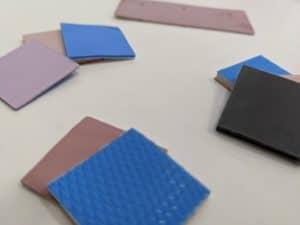
thermal pads
In one of our other blogs, we mentioned other different types of thermal pads and their advantages. Many thermal pads are used as replacements for thermal pastes. However, we never discussed different advantages that thermal pads have over thermal putties/greases. Of course, at NEDC we die-cut many types of thermal pads, generally designers are weighing the differences between thermal pads vs thermal pastes.
Advantages/Disadvantages of Thermal Pads vs Thermal Pastes
When we mention thermal pastes here, we are describing one part thermal pastes.
Advantages:
- Thermal Pads are much cleaner than thermal pastes. Thermal pastes can be applied in a very messy manner, and can take time to properly clean up.
- Bigger gaps can be filled. Many Gap Pads come in thicknesses ranging up to .250’’ in thickness.
- Thermal Pads do not dry out as easily as thermal pastes.
- Thermal Pads do not slide out as easily as thermal pastes do – since thermal pastes are uncured, extrusion of the TIM is a concern for thermal pastes.
- Packaging/repackaging, sealing is a lot easier, i.e splitting the parts up into kits.
- Since thermal pads may be required to be precision cut for certain applications you can guarantee the same result every time. With thermal pastes, application may go different from application to application. Adding thermal paste can be difficult for some operators to add- thermal pads are similiar no matter who is doing it.
Disadvantages:
- A third party almost always has to be involved for precision cutting. At NEDC, we would be that third party.
- Thermal Pastes will generally have better contact with the imperfect topologies.
- For short-medium prototype work thermal pastes generally have a cost advantage.
- Getting an exact cut of a thermal pad for complex configurations will require custom die cutters.
More Info
NEDC provides many different types of thermal interface pads, including silicone-free, graphite-based, and other options through die cutting operations. For more information on thermal pads, please contact sales@nedc.com.